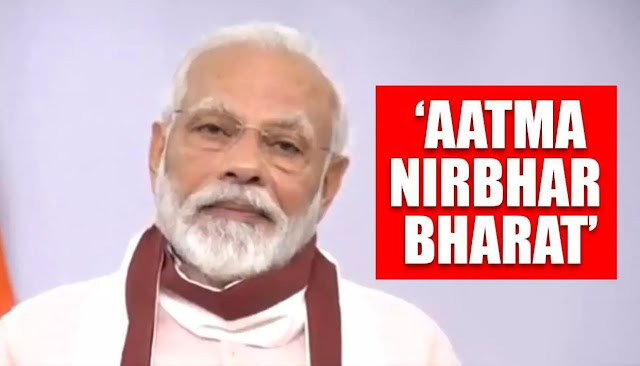Time to make India Self-Reliant
Appealing to the citizens to be even more careful in the time unlock, Prime Minister Narendra Modi on Sunday said that India is unlocking, be it in sectors like coal, space, agriculture, and more and it is now the time to work together to make India self-reliant and technologically advanced. "We are in the time of unlocking. But, we have to be even more careful. India is unlocking, be it in sectors like coal, space, agriculture, and more and it is now the time to work together to make India self-reliant and technologically advanced," said Prime Minister during his monthly-radio program Mann Ki Baat. During this unlock period, one will have to focus deeply on two points- defeating corona and strengthening the economy and bolstering it, he said.
The Prime Minister stressed on the importance of following COVID-19 norms to combat the pandemic. "If you do not wear a mask, do not observe the two-yard social distancing norms, or do not take other precautions, you are putting others at risk besides yourselves, especially the elderly and children at home.
This, on the one hand, grants freedom to farmers to sell their products to anyone they wish to, anywhere; on the other hand, this has paved the way for enhanced loans. There are many such sectors in which, amidst, all crises, our country is opening up new avenues of development through historic decisions," the Prime Minister said. (ANI)
Not only Atmanirbhar Bharat Abhiyan is initiated towards making India self reliant , Aatmabharat also aims to do so. Here you get so many ideas about how you can enhance and build yourself and your business self reliant. Stay connected with aatmabharat to get the latest and top updates as soon as they are launched.
The Prime Minister stressed on the importance of following COVID-19 norms to combat the pandemic. "If you do not wear a mask, do not observe the two-yard social distancing norms, or do not take other precautions, you are putting others at risk besides yourselves, especially the elderly and children at home.
This, on the one hand, grants freedom to farmers to sell their products to anyone they wish to, anywhere; on the other hand, this has paved the way for enhanced loans. There are many such sectors in which, amidst, all crises, our country is opening up new avenues of development through historic decisions," the Prime Minister said. (ANI)
Not only Atmanirbhar Bharat Abhiyan is initiated towards making India self reliant , Aatmabharat also aims to do so. Here you get so many ideas about how you can enhance and build yourself and your business self reliant. Stay connected with aatmabharat to get the latest and top updates as soon as they are launched.
No, the ‘Self-Reliant India Campaign’ Is Not AboutProtectionism
- Its name – Atmanirbhar Bharat Abhiyan in Hindi – indeed makes one think that the initiative is permeated with the idea of self-reliance.
- Some were quick to claim that India is on the way to become an economy walled off by protectionism. Generalizing comparisons with trends in other countries, such as the United States, have been drawn, and a standard cry of “globalization in retreat” has been raised.
- So far, hardly any limits on trade are at hand. Neither non-tariff barriers on foreign trade nor restrictions on FDI have been envisaged as part of the campaign. Moreover, some of the reforms within the package are going the opposite way by allowing a wider involvement of private and foreign entities.
- In practice, the campaign turns out to be less about finding an island of protectionism for the shaken ship of the Indian economy, but about navigating the stormy sea of a financial crisis while still staying in the waters of international markets.
- The campaign’s core solutions are various types of financial support and an easing of rules aimed particularly those citizens and companies that were deeply affected by financial distress: guarantees of food and wages for many poor citizens, loans for MSMEs and agriculturalists, a credit facility for street vendors, free grain distribution for migrants, helping companies stay afloat on the turbulent waves of liquidity, and a whole range of other solutions.
- None of these can be considered protectionist; it is but natural that under the current circumstances every government focuses primarily on helping the companies and citizens of its own country.
- While these are responses to a new crisis, some of the campaign’s other elements bear a mark of continuation, rather than revolution.
- Atmanirbhar Bharat Abhiyan includes reforms that were in fact planned or considered earlier and could have taken place anyway, even without the pandemic (and the crisis that follows in its steps like a shadow).
- There is no doubt that China is not offering a level playing field when it comes to its trade with other countries. Thus New Delhi’s avoidance of RCEP does not signal that it is steering the country toward autarky. While certainly too much was read into the Self-Reliant
- India catchphrase, there is one way we could explain it to both make sense of this idea and not deem it protectionist. Within the party ruling in India, the Bharatiya Janata Party, there have long been two broad strands when it comes to political economy.
- One called for freer markets, while the others stood by the idea of swadeshi: the concept supporting primarily domestic products and companies, including by protecting them from foreign competition. Over the last years, the former faction has been increasingly influential.
- Take defense, for instance: while defense imports are now to be restricted, FDI in this sector has also been made wider. We may simply understand these measures to be two separate fronts, meant to deal with a different aspects of military production.
- But if we have to weave them both into one general picture, the explanation would be that New Delhi does not want to be dependent on imports; it is open, however, to bringing in external expertise through FDI with the hope of settling production in India and gradually learning the technology.
- The Indian government’s other decisions unveiled under the current campaign suggest that the same approach is being applied to the sectors of space exploration, coal mining, and the use of nuclear technology for medical purposes.
- In a nutshell, the final goal is not to make India self-reliant – no country truly is – but to make its companies, especially the private ones, stronger, more advanced, and less dependent on state bureaucracy.
- And if indeed there is one common denominator behind this approach to FDI, it does not rest on the values of economic nationalism, but on the concept of value-added production.
PM Modi calls for people’s participation towards Self-Reliant India
New Delhi: In his Mann Ki Baat program today, Prime Minister Narendra Modi said, no mission can be successfully achieved without people’s participation.
He urged the citizens to strive for a self-reliant India with their collective resolve, commitment, and support.
Mr. Modi said, when people buy local, become vocal for local they play a role in strengthening the country. He added that this too, in its own way, is service to the nation.
PM Modi said, during this unlock phase, many other things are getting unlocked, which had hitherto, shackled the country for decades.
He said, for years the mining sector, space, and agriculture were in a state of lockdown. Now the decisions taken by the Government have unshackled the bottlenecks and given a boost to these sectors.
He referred to commercial auction in mining, opening up of the space sector and reforms in agriculture towards a self-reliant India with the advancement of technology.
PM Modi said, there are many such sectors in which, amidst, all crises, the country is opening up new avenues of development through historic decisions.




Comments
Post a Comment